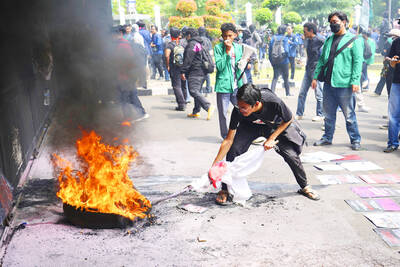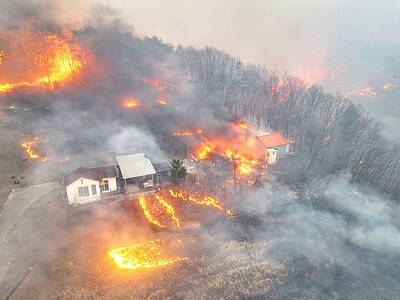A democratic China could present Asia-Pacific countries with major problems never experienced under the current authoritarian regime, an Australian defense think tank said yesterday.
The Australian Strategic Policy Institute said China's aging communist leadership was committed to peacefully pursuing economic expansion but that could change when the next generation of leaders takes over.
In a report entitled In the Balance: China's Unprecedented Growth and Implications for the Asia-Pacific, the institute said countries in the region must carefully engage China.
It said the impending generational change in leadership meant Tokyo and Washington could not afford to isolate China because of their concerns about its increasing economic power and burgeoning defense spending.
"When a fifth generation of leadership assumes power in ten to fifteen years, China could become more open and tolerate greater dissent," the report said.
"Such a political opening could then open the door to forces such as nationalism and populism. There is no way to predict exactly how Chinese politics will evolve in a more democratic era, but it is a development which could produce new challenges for the countries of East Asia after 2020.
"An authoritarian China has been highly predictable. A more open and democratic China could produce new uncertainties about both domestic policy and international relations."
The report's author, US-based economist and China specialist David Hale, said Taiwan and North Korea represented the major potential flashpoints involving China, along with Beijing's long-standing differences with Japan.
But the report said the current Chinese leadership had a vested interest in maintaining stability in the region because exports underpinned its booming economy.
"It is unusual for a country as large as China to be so heavily dependent upon foreign trade but as a result of low labour costs, good infrastructure, and pro-business economic policies the global corporate community has turned China into a workshop of the world," it said.
"China has become so integrated with the global economy that she can no longer pursue a high-risk foreign policy without jeopardizing her economic prosperity," it continued.
Hale said China was likely to threaten other countries only if there was domestic political instability which produced an upsurge in nationalism and a search for external scapegoats.
He said such instability could be sparked if dissatisfaction over increasing income inequality in China resulted in a populist government that suspended economic reforms.

DEATH CONSTANTLY LOOMING: Decades of detention took a major toll on Iwao Hakamada’s mental health, his lawyers describing him as ‘living in a world of fantasy’ A Japanese man wrongly convicted of murder who was the world’s longest-serving death row inmate has been awarded US$1.44 million in compensation, an official said yesterday. The payout represents ¥12,500 (US$83) for each day of the more than four decades that Iwao Hakamada spent in detention, most of it on death row when each day could have been his last. It is a record for compensation of this kind, Japanese media said. The former boxer, now 89, was exonerated last year of a 1966 quadruple murder after a tireless campaign by his sister and others. The case sparked scrutiny of the justice system in

The head of Shin Bet, Israel’s domestic intelligence agency, was sacked yesterday, days after Israeli Prime Minister Benjamin Netanyahu said he no longer trusts him, and fallout from a report on the Oct. 7, 2023, Hamas attack. “The Government unanimously approved Prime Minister Benjamin Netanyahu’s proposal to end ISA Director Ronen Bar’s term of office,” a statement said. He is to leave his post when his successor is appointed by April 10 at the latest, the statement said. Netanyahu on Sunday cited an “ongoing lack of trust” as the reason for moving to dismiss Bar, who joined the agency in 1993. Bar, meant to

Indonesia’s parliament yesterday amended a law to allow members of the military to hold more government roles, despite criticisms that it would expand the armed forces’ role in civilian affairs. The revision to the armed forces law, pushed mainly by Indonesian President Prabowo Subianto’s coalition, was aimed at expanding the military’s role beyond defense in a country long influenced by its armed forces. The amendment has sparked fears of a return to the era of former Indonesian president Suharto, who ex-general Prabowo once served and who used military figures to crack down on dissent. “Now it’s the time for us to ask the

‘HUMAN NEGLIGENCE’: The fire is believed to have been caused by someone who was visiting an ancestral grave and accidentally started the blaze, the acting president said Deadly wildfires in South Korea worsened overnight, officials said yesterday, as dry, windy weather hampered efforts to contain one of the nation’s worst-ever fire outbreaks. More than a dozen different blazes broke out over the weekend, with Acting South Korean Interior and Safety Minister Ko Ki-dong reporting thousands of hectares burned and four people killed. “The wildfires have so far affected about 14,694 hectares, with damage continuing to grow,” Ko said. The extent of damage would make the fires collectively the third-largest in South Korea’s history. The largest was an April 2000 blaze that scorched 23,913 hectares across the east coast. More than 3,000